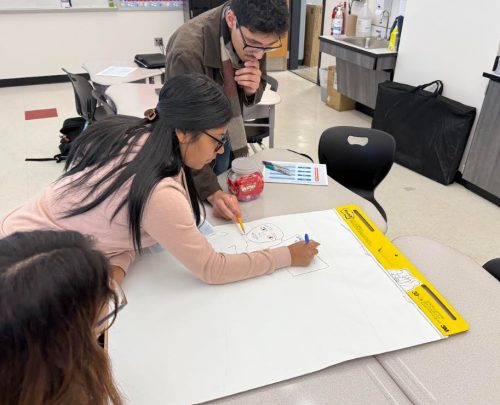The Academic Community Engagement (ACE) Fellowship, sponsored by the Office of Civic and Community Engagement, is a structured two-year program designed to support faculty through the development and facilitation of community-based teaching and research projects. Fellows are exposed to best practices when designing programs aimed at creating and improving partnerships in the Winston-Salem community and offered a stipend to support financial needs along the way.
Project Protocol, Activities, Results
My research project partnered with Winston-Salem Forsyth County Schools (WSFCS) and included instructional sessions with high school students in the Career Technical Education (CTE) Health Science track. Three modules were available for teacher selection based on curriculum needs: Pseudoscience: Mis-, Dis-, and Malinformation, Human Vulnerabilities to Health Information, and Health Insurance 101. Sessions took place during a 90-minute block period and included pre- and post-quizzes based on concepts shared in each session to assess prior knowledge and immediate retention of covered concepts.

Modules included instructional content and activities that fostered engagement between students and the material. During a Health Insurance session in the Pharmacy Tech course at John F. Kennedy High School (JFKHS), students created comic strips depicting subscriber concerns when determining insurance company prescription formularies. Health comics, a form of Graphic Health, aim to improve health literacy, promote healthy behaviors, communicate risks, and advocate for health issues while reaching a wide audience and making complex health information more accessible and engaging. Here, JFKHS students are creating a comic about how to obtain a Tier 4 or “specialty pharmacy” prescription.
The High School Health Literacy Pilot Project reached 91 students during the 2024-25 academic year through 20 sessions at four district high schools. Assessments collected 195 pre-test and 153 post-test responses resulting in a 80.2% response rate. Each module’s post-quiz scores are up to 70% higher relative to pre-quiz correctness per question in many cases. The aggregation of all quiz responses reveals near statistical significance in two out of three modules (where p<.05) and individual quiz question response results show significance in 92% of Pseudoscience quiz questions (Human Vulnerabilities, 60%; Health Insurance, 87%). Full study results are forthcoming, but a graphical summary can be found here: https://tinyurl.com/3dnm5nk5
Next Steps
This project will continue through the 2025-26 academic year having obtained IRB and WSFCS district approvals. With goals to reach 150 additional students at six high schools, next year’s protocol will include a new module – The History of Medicine and Health Science Education – and a one-month follow up quiz to gauge retention values. Another future direction includes an MLIS intern or practicum student assistant to both expand scheduling options and provide experiential learning opportunities for aspiring health science librarians.
Many thanks to the ACE Fellows Program for project administrative support and ZSR for encouraging the training and development that fostered my research design and assessment.

5 Comments on ‘Colleen Completes ACE Fellowship & the High School Health Literacy Pilot Project’
This is a wonderful project Colleen. Congrats on important work and being part of this initiative.
This is important work, Colleen. Congrats on completing the ACE program and for developing and delivering health literacy content to high school students. I’m looking forward to seeing how this develops over the next year!
Colleen, what a fantastic project and such impressive and vital work! Thanks for sharing this!
Such a great project, Colleen!
It’s wonderful to see how your investment of energy in your own development helped you execute a project that in turn has a helpful (healthful!) impact beyond the campus. What a great idea to see if you can bring in a MLIS student in the future!